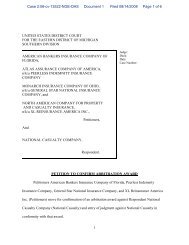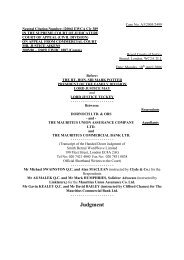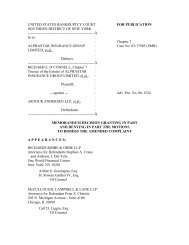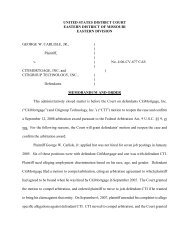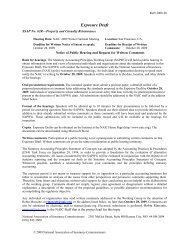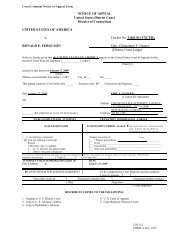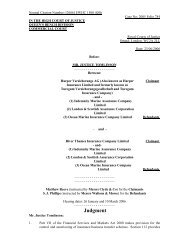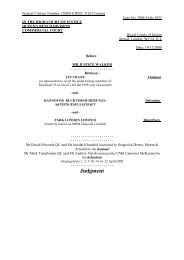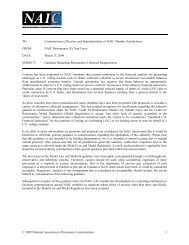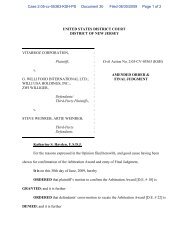Judgment - Reinsurance Focus
Judgment - Reinsurance Focus
Judgment - Reinsurance Focus
You also want an ePaper? Increase the reach of your titles
YUMPU automatically turns print PDFs into web optimized ePapers that Google loves.
38.<br />
Before considering the terms of the Completion Contract two points must be mentioned.<br />
First, whatever the nature of the casualty may suggest, there is, as Mr. Flaux was at<br />
pains to point out, nothing in the statement of facts to enable one to conclude that the<br />
damage was caused by negligence on the part of Sembawang or those for whom it<br />
was responsible. It is necessary therefore to approach the question on the assumption<br />
that it was the result of a cause beyond the reasonable control of the yard. Second, it<br />
must be borne in mind that the flooding caused damage both to the vessel itself (i.e.<br />
the original hull which was the subject of the completion work) and to the equipment<br />
that had been installed under the contract.<br />
In some respects I do not find the Completion Contract altogether easy to construe, but I<br />
think it reasonably clear from clause 13 that the work itself, including all the<br />
equipment installed pursuant to the contract, was to remain at the risk of the yard until<br />
what is described as “unconditional acceptance” by CPL. Unconditional acceptance is<br />
not defined in the contract, but it cannot have been earlier than practical completion,<br />
which occurred when the vessel had successfully completed its sea trials and was<br />
reasonably capable of being used for its intended purpose, and may be the same as<br />
final acceptance which occurred only after the completion of any outstanding items<br />
list. However, there is no comparable provision relating to the barge itself (i.e. the<br />
hull).<br />
The broad scheme of clause 15 is that Sembawang and CPL each assumed responsibility for<br />
personal injury, loss and damage resulting from its own negligence, including loss of<br />
or damage to the barge itself and any materials or equipment in the care or control of<br />
the yard. In clause 15.7 Sembawang agreed to procure at its own expense certain<br />
insurances of the sort that could be expected to provide cover against the kinds of<br />
losses and liabilities contemplated in clauses 15.1 to 15.3 and in clause 15.6 it<br />
undertook to add CPL to those policies as a co-insured and to obtain a waiver of<br />
subrogation rights in its favour. In clause 15.12 CPL undertook to arrange a builder's<br />
all risks insurance for the benefit of both parties with a waiver of subrogation rights<br />
against all assured. If these provisions had been fully performed both parties would<br />
have had the benefit of any relevant insurance cover, as far as possible, and in the<br />
event of an insured loss the insurer would not have been entitled to claim against one<br />
party in the name of the other.<br />
In the light of these provisions I think that there is some force in Mr. Flaux's submission that<br />
the parties intended that in the event of loss of or damage to the vessel or the<br />
completion work they should have recourse to insurance and should not be entitled to<br />
make claims against each other. Some support for the view that this will generally be<br />
the case where the parties have entered into a contract containing provisions of this<br />
kind can be found in paragraph 65 of the speech of Lord Hope in Co-operative Retail<br />
Services Ltd v Taylor Young Partnership Ltd [2002] UKHL 17, [2002] 1 W.L.R.<br />
1419. However, for present purposes it is unnecessary to reach any final conclusion<br />
on this question since clause 15.4 only makes Sembawang responsible for damage<br />
caused by its negligence and, as I have pointed out, it cannot be assumed that that was<br />
the cause of the flooding in this case.


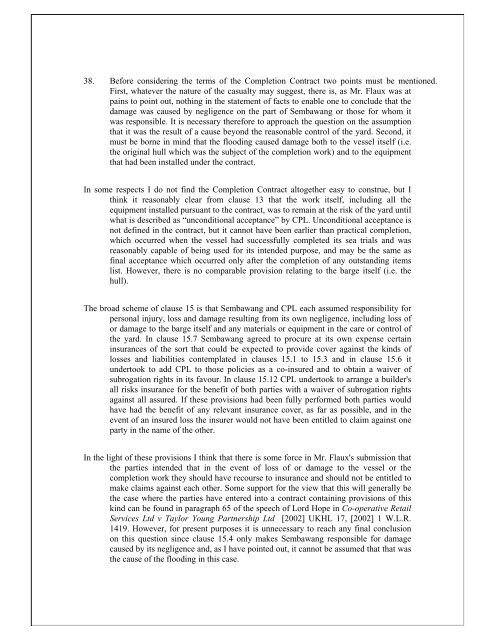
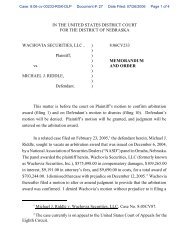
![202 Folio No 734 Neutral Citation Number: [2006] EWHC 1345 (QB ...](https://img.yumpu.com/50015000/1/184x260/202-folio-no-734-neutral-citation-number-2006-ewhc-1345-qb-.jpg?quality=85)
